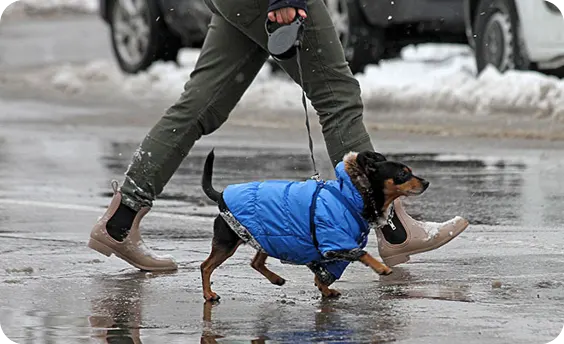As winter approaches and temperatures fall, you may think that you can give your pet a break from their tick and flea medication. But not so fast — many dogs are at risk for ticks and fleas year-round.

Not only can fleas find their way into your home during colder months (typically hitching a ride on the backs of mice and rodents that head into homes for warmth as the winter approaches), but many tick species can survive – and even thrive – throughout the winter. Of course, some of this depends on where you live and travel to with your dog, but most regions of the country are affected. And with increasingly warmer winters,1 this is truly no time to let your guard down.
Is Tick and Flea Medication Necessary in the Winter?
Yes. Though many species of ticks, and fleas, are slowed down or dormant during the winter, most regions of the United States are not cold enough to truly kill these parasites and stop their activity. Because ticks and fleas can carry diseases that could harm your dog, it’s best to keep them protected all year long.3
Risks of Ticks in the Winter
Specific ticks, like the blacklegged (deer) ticks in the Northeast, western blacklegged ticks along the West Coast, and brown dog ticks in the southern half of the United States, can remain active all winter.
Gulf Coast Ticks, which can transmit tick paralysis, can be active in temperatures as low as 39.2 degrees Fahrenheit.2 That means that in many parts of the United States, it’s not cold enough to stop tick activity. This tick’s range is expanding beyond the Gulf Coast states.
It’s best to keep your dog on tick and flea preventive medication year-round since you never know when a thaw will be warm enough to allow ticks to be active again.
Risks of Fleas in the Winter
In mild climates, fleas can be a year-round nuisance for your dog, since it never gets cold enough for them to go dormant. In colder climates, fleas can survive in warmer areas like barns, animal dens, or in and under homes. All it takes is one mild day for fleas to become active again.
After major wet weather events, such as hurricanes, fleas are very common. Additionally, if you plan on traveling during the winter with your dog, you may be traveling to a region where ticks and fleas remain active year-round. If you live in an area that can be affected by these weather patterns (or are traveling to one), it’s important to keep your pet on flea medication to keep them protected from the diseases that fleas carry.
ZPC-00449R2
Important Safety Information: Use with caution in dogs with a history of seizures. Simparica Trio contains sarolaner, a member of the isoxazoline class which has been associated with neurologic adverse reactions including tremors, ataxia, and seizures in dogs with or without a history of neurologic disorders. The safe use of Simparica Trio has not been evaluated in breeding, pregnant, or lactating dogs. The most frequently reported adverse reactions in clinical trials were vomiting and diarrhea. See full Prescribing Information.
SIMPARICA TRIO is indicated for the prevention of heartworm disease caused by Dirofilaria immitis and for the treatment and control of roundworm (immature adult and adult Toxocara canis and adult Toxascaris leonina) and hookworm (L4, immature adult, and adult Ancylostoma caninum and adult Uncinaria stenocephala) infections. SIMPARICA TRIO kills adult fleas (Ctenocephalides felis) and is indicated for the treatment and prevention of flea infestations, and the treatment and control of tick infestations with Amblyomma americanum (lone star tick), Amblyomma maculatum (Gulf Coast tick), Dermacentor variabilis (American dog tick), Ixodes scapularis (black-legged tick), Rhipicephalus sanguineus (brown dog tick), and Haemaphysalis longicornis (Asian longhorned tick) for one month in dogs and puppies 8 weeks of age and older, and weighing 2.8 pounds or greater. SIMPARICA TRIO is indicated for the prevention of Borrelia burgdorferi infections as a direct result of killing Ixodes scapularis vector ticks.
- Warming winters across the United States. https://www.climate.gov/news-features/blogs/beyond-data/warming-winters-across-united-states. Accessed January 10, 2025.
- Duffy DC, Campbell SR. Ambient air temperature as a predictor of activity of adult Ixodes scapularis (Acari:Ixodidae). J Med Entomol 31:178-180 (1994).
- Beall MJ, Chandrashekar R, Eberts MD, et al. Serological and molecular prevalence of Borrelia burgdorferi, Anaplasma phagocytophilum, and Ehrlichia species in dogs from Minnesota. Vector Borne Zoonotic Dis 2008; 8:455-464




.png)

